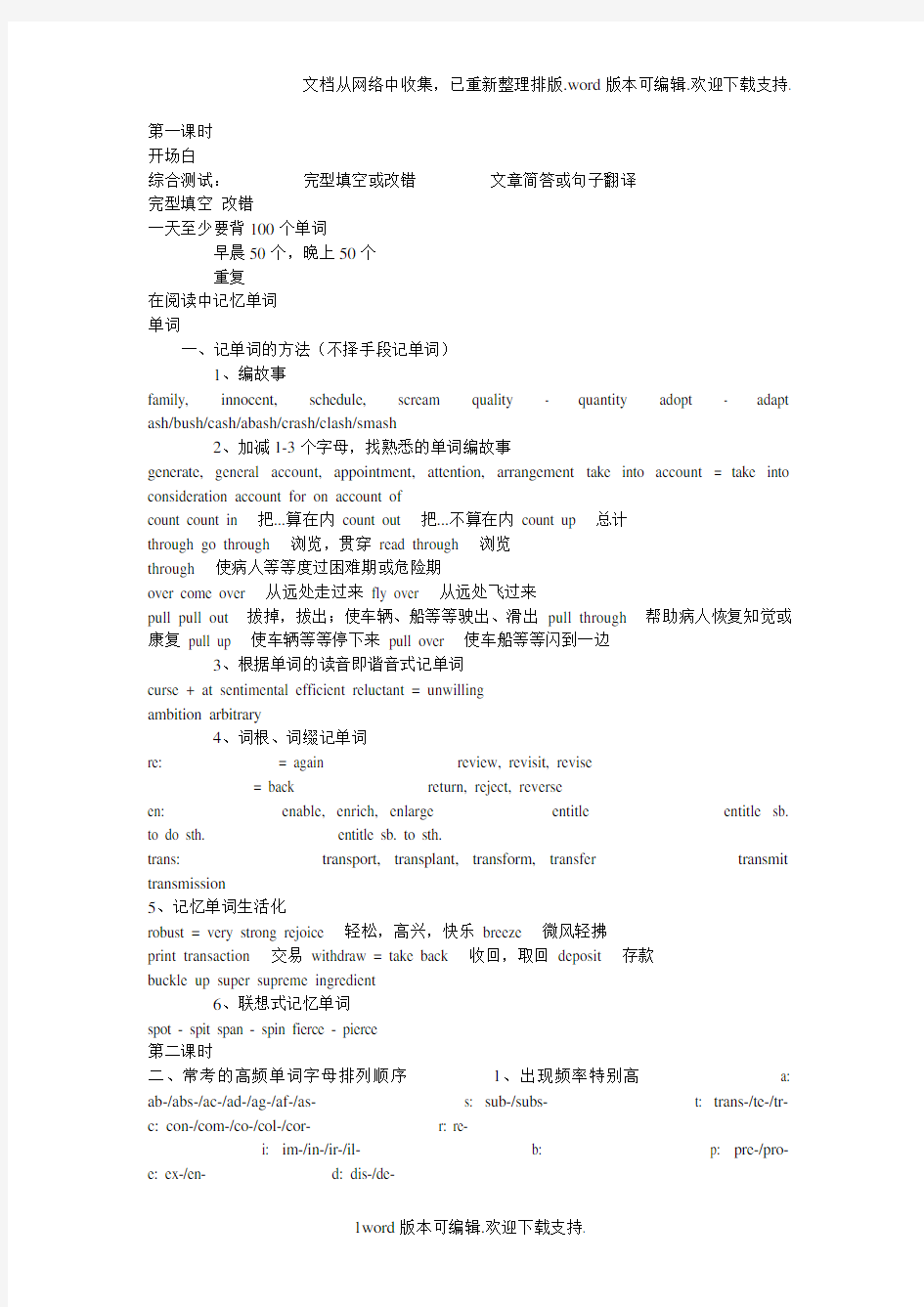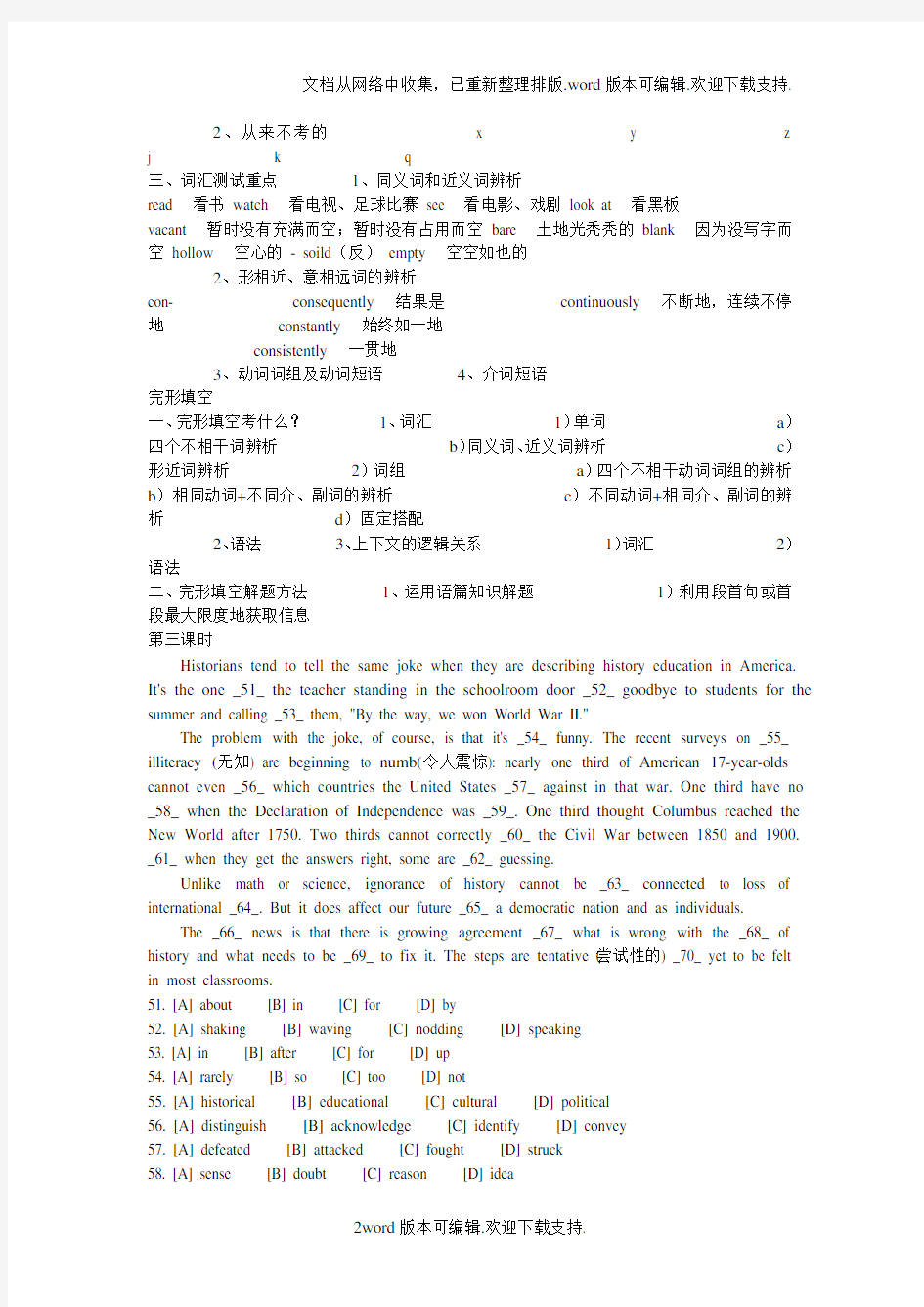

第一课时
开场白
综合测试:完型填空或改错文章简答或句子翻译
完型填空改错
一天至少要背100个单词
早晨50个,晚上50个
重复
在阅读中记忆单词
单词
一、记单词的方法(不择手段记单词)
1、编故事
family, innocent, schedule, scream quality - quantity adopt - adapt ash/bush/cash/abash/crash/clash/smash
2、加减1-3个字母,找熟悉的单词编故事
generate, general account, appointment, attention, arrangement take into account = take into consideration account for on account of
count count in 把...算在内count out 把...不算在内count up 总计
through go through 浏览,贯穿read through 浏览
through 使病人等等度过困难期或危险期
over come over 从远处走过来fly over 从远处飞过来
pull pull out 拔掉,拔出;使车辆、船等等驶出、滑出pull through 帮助病人恢复知觉或康复pull up 使车辆等等停下来pull over 使车船等等闪到一边
3、根据单词的读音即谐音式记单词
curse + at sentimental efficient reluctant = unwilling
ambition arbitrary
4、词根、词缀记单词
re: = again review, revisit, revise
= back return, reject, reverse
en: enable, enrich, enlarge entitle entitle sb. to do sth. entitle sb. to sth.
trans: transport, transplant, transform, transfer transmit transmission
5、记忆单词生活化
robust = very strong rejoice 轻松,高兴,快乐breeze 微风轻拂
print transaction 交易withdraw = take back 收回,取回deposit 存款
buckle up super supreme ingredient
6、联想式记忆单词
spot - spit span - spin fierce - pierce
第二课时
二、常考的高频单词字母排列顺序1、出现频率特别高a: ab-/abs-/ac-/ad-/ag-/af-/as- s: sub-/subs- t: trans-/te-/tr- c: con-/com-/co-/col-/cor- r: re-
i: im-/in-/ir-/il- b: p: pre-/pro- e: ex-/en- d: dis-/de-
2、从来不考的x y z j k q
三、词汇测试重点1、同义词和近义词辨析
read 看书watch 看电视、足球比赛see 看电影、戏剧look at 看黑板
vacant 暂时没有充满而空;暂时没有占用而空bare 土地光秃秃的blank 因为没写字而空hollow 空心的- soild(反)empty 空空如也的
2、形相近、意相远词的辨析
con- consequently 结果是continuously 不断地,连续不停地constantly 始终如一地
consistently 一贯地
3、动词词组及动词短语
4、介词短语
完形填空
一、完形填空考什么?1、词汇1)单词a)四个不相干词辨析b)同义词、近义词辨析c)形近词辨析2)词组a)四个不相干动词词组的辨析b)相同动词+不同介、副词的辨析c)不同动词+相同介、副词的辨析d)固定搭配
2、语法
3、上下文的逻辑关系1)词汇2)语法
二、完形填空解题方法1、运用语篇知识解题1)利用段首句或首段最大限度地获取信息
第三课时
Historians tend to tell the same joke when they are describing history education in America. It's the one _51_ the teacher standing in the schoolroom door _52_ goodbye to students for the summer and calling _53_ them, "By the way, we won World War II."
The problem with the joke, of course, is that it's _54_ funny. The recent surveys on _55_ illiteracy (无知) are beginning to numb(令人震惊): nearly one third of American 17-year-olds cannot even _56_ which countries the United States _57_ against in that war. One third have no _58_ when the Declaration of Independence was _59_. One third thought Columbus reached the New World after 1750. Two thirds cannot correctly _60_ the Civil War between 1850 and 1900. _61_ when they get the answers right, some are _62_ guessing.
Unlike math or science, ignorance of history cannot be _63_ connected to loss of international _64_. But it does affect our future _65_ a democratic nation and as individuals.
The _66_ news is that there is growing agreement _67_ what is wrong with the _68_ of history and what needs to be _69_ to fix it. The steps are tentative (尝试性的) _70_ yet to be felt in most classrooms.
51. [A] about [B] in [C] for [D] by
52. [A] shaking [B] waving [C] nodding [D] speaking
53. [A] in [B] after [C] for [D] up
54. [A] rarely [B] so [C] too [D] not
55. [A] historical [B] educational [C] cultural [D] political
56. [A] distinguish [B] acknowledge [C] identify [D] convey
57. [A] defeated [B] attacked [C] fought [D] struck
58. [A] sense [B] doubt [C] reason [D] idea